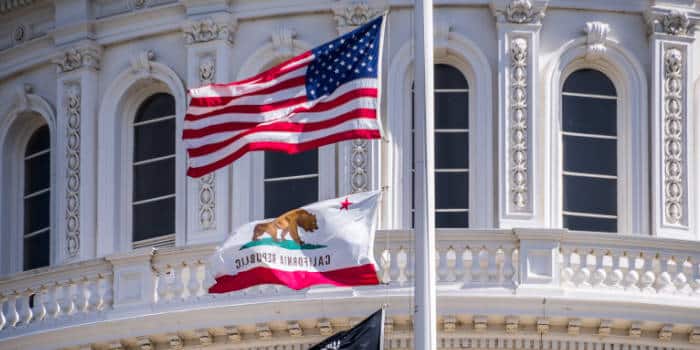California’s new Tribal Nations Access to Justice Act signed into law over the weekend may enable Native American tribes to legally challenge the operations of long-established card rooms in Los Angeles County and beyond

A new California law may soon allow Native American tribes to legally challenge the operations of certain small casinos, or card rooms, that have existed for decades in Los Angeles County and other parts of the state.
These establishments, typically limited to table games rather than slot machines, represent vital revenue sources for their cities but could now be at risk of closure, jeopardizing millions in local tax dollars.
However, the Tribal Nations Access to Justice Act (Senate Bill 549) was signed into law by Governor Gavin Newson over the weekend after extensive multi-million dollar lobbying efforts, with opposition from important names including Los Angeles’s second-largest newspaper, The Daily News, that called SB 549 a “mockery” of the state’s judicial system.
Tribal groups argue that these smaller venues, which rely heavily on popular games such as blackjack, are infringing on exclusive gaming rights that belong solely to tribal casinos under California law.
Heavy Toll on State and Local Taxes
The California Cardroom Alliance, one of the strongest voices opposing the law and also a representative of card room operators across the state, has argued that the measure “could easily force card rooms out of business.”
According to Keith Sharp, president of the Alliance, the financial loss could amount to $500 million annually in state and local tax revenue, impacting essential public services, education, and infrastructure funding.
Card room representatives anticipate that legal challenges from tribes will emerge soon.
Proponents of the law see it as a long-overdue correction that supports the rights of Native American tribes to protect their interests in the gaming sector.
“For much of California history, tribes have been precluded from having access to justice to defend what was rightfully ours,” said James Siva, a member of the Morongo Band of Mission Indians and chair of the California Nations Indian Gaming Association.
Siva argues that the opposition from card rooms “makes plainly apparent that these establishments are not at all confident that what they are doing is legal.”
Debate on Game Classification
A key point of contention lies in whether card rooms are conducting games in a manner reserved for tribal casinos.
According to the tribes, games like blackjack are explicitly classified as Las Vegas-style gambling, which the state constitution restricts to tribal-run facilities.
Typically, card rooms rely on third-party companies to handle chips and payouts, skirting a legal requirement that bars them from direct involvement in bets.
This workaround has received approval from California’s Department of Justice over the years, but the new law may prompt fresh judicial review.
“This Is a Matter of Law and Not of Policy”
Senator Josh Newman, who sponsored the legislation, emphasized that the intent is to provide tribes with a fair legal forum.
Newman went on to say that, in case of a court ruling favorable for the tribes, he would express “an immense amount of sympathy for the workers and other affected community entities” while bluntly calling it “a matter of law and not of policy.”
Mr. Siva stated that the law represents a move toward greater transparency, adding that the opposition from card room operators “makes plainly apparent that these establishments are not at all confident that what they are doing is legal.”
“The Casinos Are a Lifeline”
The impact of these legal challenges is already felt at the city level.
The Gardens Casino in Hawaiian Gardens, for instance, plays a pivotal role in funding the community.
According to Mayor Victor Farfan, the casino is not only the city’s largest employer, with 1,100 workers, but it also generates about $13 million in annual taxes, sustaining programs for youth and seniors.
Farfan emphasized the importance of the revenue: “The casino keeps us afloat financially.”
When asked about what would happen provided the city’s card room would close, Farfan, in an interview for The New York Times’ Kurtis Lee reporting from the Southern California communities of Hawaiian Gardens and Commerce, immediately recalled the COVID-19 pandemic, when card rooms in Los Angeles County closed and Hawaiian Gardens faced severe financial strain, forced to lay off staff and cut hours due to lost income.
Commerce, a nearby city, also relies heavily on revenue from its own card room, the Commerce Casino, which contributes roughly 40% of the city’s budget.
For city officials like 31-year-old management analyst Gisselle Delgado, these casinos are lifelines and “not a burden,” providing crucial funding for public services and community development.
While Giselle does not gamble herself, she is well aware that “the taxes from gambling have funded her salary — along with about 40 percent of the municipal budget,” according to her interview for the NY Times.
Potential Long-Lasting Financial Implications
Tribal donations to lawmakers played an important role in the legislative push, with some committee members receiving hundreds of thousands of dollars in support.
As lawsuits begin to surface, local communities could face financial implications in the long run.
The new law allows tribes to present their case in state courts until April 1.
The ongoing tension underscores the balance between California’s long history of small card rooms and the financial and political power of the state’s Native American tribes, whose gaming operations contribute nearly $35 billion to the economy.

